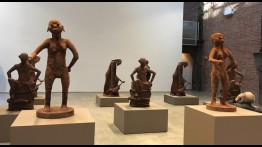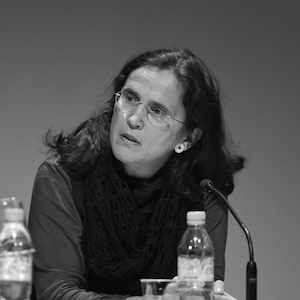Plunder: The Origins of Modern Art
Mon, Feb 26, 7:30pm - Tue, Feb 13, 2018 9pm

Installation view, Cercle d'Art des Travailleurs de Plantation Congolaise, SculptureCenter, New York, 2017. Photo: Ariella Azoulay
From the beginning, art has been imperialism’s preferred terrain. Much has been written about the impoverishment of different cultures whose artistic treasures were expropriated to enrich Western aristocracies and embellish Western museums. What will be the meaning of modern art if we consider this plunder its origin?
Ariella Azoulay is a Professor of Modern Culture and Media and Comparative Literature at Brown University, a film essayist, and an independent curator of archives and exhibitions. Azoulay’s research and forthcoming book focus on the potential history of key political concepts-institutions: archives, sovereignties, art, revolutions, and human rights. Potential history, a concept and an approach that she has developed over the last decade, has far-reaching implications for the fields of political theory, knowledge formations and visual culture. Her books include: Civil Imagination: The Political Ontology of Photography (Verso, 2012) and The Civil Contract of Photography (Zone Books, 2008). Her first photographic archive, Act of State 1967-2007, is part of the Centre Pompidou collection and accessible to researchers.
Centre Pompidou collection and accessible to researchers.
This event, held in partnership with the Hagop Kevorkian Center for Near Eastern Studies at NYU, is part of the Spring 2018 IDS Lecture Series at The Cooper Union, organized by Leslie Hewitt and Omar Berrada.
The IDS Public Lecture Series is part of the Robert Lehman Visiting Artist Program at The Cooper Union. We are grateful for major funding and support from the Robert Lehman Foundation for the series. The IDS Public Lecture Series is also made possible by the New York State Council on the Arts with the support of Governor Andrew M. Cuomo and the New York State Legislature.
Located in the Frederick P. Rose Auditorium, at 41 Cooper Square (on Third Avenue between 6th and 7th Streets)




